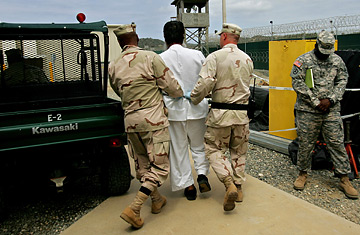
A detainee escorted by U.S. military personnel at Guantanamo Bay US Naval Base, Cuba.
High-decibel hearings held last week on the rights of Guantanamo Bay detainees cannot drown out a sorry truth about Congress: The war on terrorism has passed it by.
Rep. Ike Skelton, the Democratic chairman of the House Armed Services Committee, set the rhetorical tone for committee hearings Thursday on whether to grant detainees habeas corpus, the right to argue in court that they are illegally held. "We must match our bedrock commitment to the rule of law and human rights," the septuagenarian declared, "to the enemy's propaganda of hatred."
His words might have inspired meaningful action had they come, say, four years ago. Now, though, they're little more than lofty talk. Even if Congress does pass a bill giving detainees the right to habeas, the legislation will probably amount to zip. The reason is not that President Bush will veto it — although he very well might — but that the detainees may soon get that right without congressional assistance. And how? Either the Supreme Court or the President himself will give it to them.
It's confusing, I know. But it also makes sense when you consider the feckless performance of Congress since the beginning of this war.
Back in November 2001, Bush created military tribunals to determine the fate of Guantanamo detainees. The tribunals lacked even the basics of due process — rules to ensure the reliability of evidence, for example, or the ability to appeal a decision — let alone the right to habeas corpus. Congress reacted to the tribunals by doing absolutely nothing. It didn't approve or disapprove them, but left Bush free to romp over the legal rights of anyone suspected of terrorism. As Michael Greenberger, a law professor at the University of Maryland and the head of its Center for Health and Homeland Security, has pointed out, staying silent is not the way this constitutional game should be played.
When Abraham Lincoln suspended habeas during the Civil War and Franklin Roosevelt ordered Japanese-Americans rounded up after Pearl Harbor, Congress quickly debated, and then blessed, the actions retroactively. As a result, Americans were "reassured that the President's unilateral action would stand only with the approval of their congressional representatives, as the founding fathers intended," Greenberger explained in Legal Affairs magazine.
Americans — and the world at large, for that matter — received no such reassurance about Bush's actions. Instead, they got Abu Ghraib, murky interrogation techniques and assorted other products of executive power gone unchecked. Not until 2004 did another branch of the federal government step in, and it was the Supreme Court, which ruled that the U.S. courts had the authority to review detainee cases and that military tribunals fell far short of the fair hearings required by law.
Jostled awake by the rulings, the Republican-controlled Congress finally weighed in with a 2005 law prohibiting the inhumane treatment of prisoners but also stripping Guantanamo detainees of the right to habeas corpus. By then, though, it was already late. In 2006, the Supreme Court, skeptical of how suspected terrorists were being treated, ruled that the habeas-stripping provision of the new law didn't apply to pending cases. Congress quickly responded with yet another law — the Military Commissions Act — removing court jurisdiction over all detainee cases, so the only way a detainee can now challenge his imprisonment is before a bare-bones military commission, and then, in a review limited to whether the commission followed its own rules, before the U.S. Court of Appeals in Washington.
But that's hardly the end of the story. The Supreme Court has agreed to review the Military Commissions Act, and things don't look good for Bush. The act's opponents argue essentially that it can't overcome the Constitution's bar to suspending habeas except in cases of "rebellion or invasion," conditions that, no matter how dramatically the President may portray the war on terrorism, don't exist. The act's supporters counter that the constitutional provision doesn't apply to people held outside the U.S., in places like Guantanamo.
But the justices aren't likely to warm to the supporters' argument. First, they've already ruled that Guantanamo operates as part of the U.S. in most ways relevant to this case. Second, they don't much like the Administrations record on terrorism. The abuse of prisoners at Abu Ghraib and the memo purporting to exempt the President from anti-terror laws probably pushed the justices in 2004 to grant detainees the right to go to court. An insider's harsh criticism of the tribunal system, Colin Powell's call for the closing of Guantanamo and the refusal of two military judges to proceed with tribunal hearings may be enough for the justices to grant detainees habeas this time. Third, at least five justices — John Paul Stevens, David Souter, Ruth Bader Ginsberg, Steven Breyer and, believe it or not, Anthony Kennedy — have suggested in past opinions that they won't deny detainees access to the courts.
The Bush Administration can count heads too, and a loss in this case could, among other untenable things, destroy its theory that it can treat as it wishes suspects held outside the U.S. — including at Guantanamo. And with public support for Guantanamo already low, there is a good chance the Administration would close the detention center and bring prisoners to the U.S. before it would risk losing again in the Supreme Court. Once in the U.S., the detainees would almost certainly have the right to habeas.
All this leaves Congress in an awkward position. The House and Senate can slam the enemy's hatred and espouse the nation's values all they want. Maybe they can even end the war in Iraq. But when it comes to defining the legal rights of suspected terrorists, they're long out of the game.
